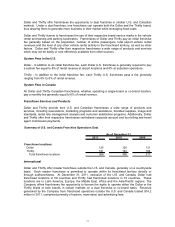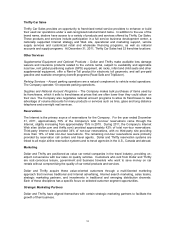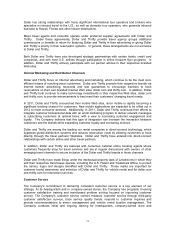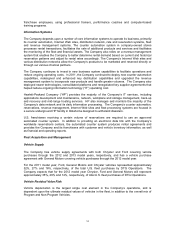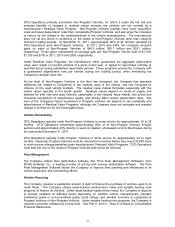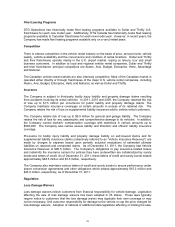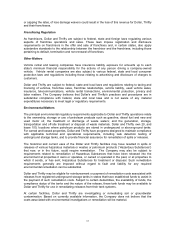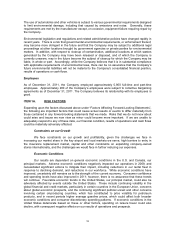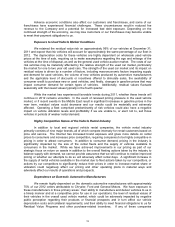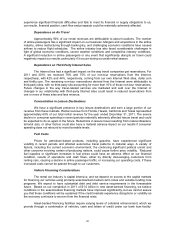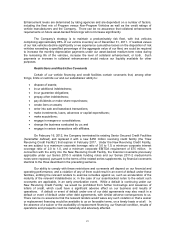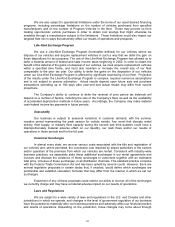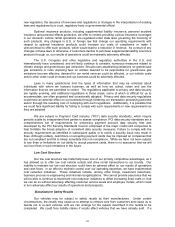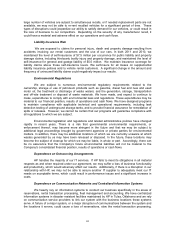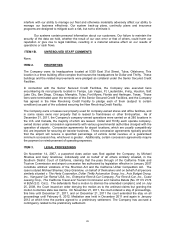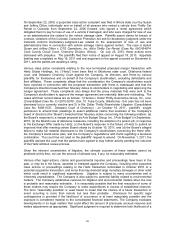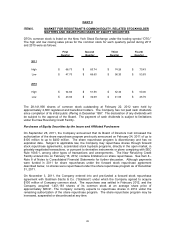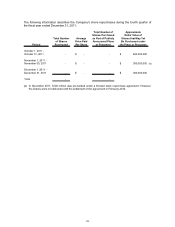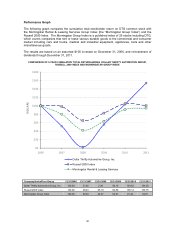Thrifty Car Rental 2011 Annual Report Download - page 23
Download and view the complete annual report
Please find page 23 of the 2011 Thrifty Car Rental annual report below. You can navigate through the pages in the report by either clicking on the pages listed below, or by using the keyword search tool below to find specific information within the annual report.Enhancement levels are determined by rating agencies and are dependent on a number of factors,
including the fleet mix of Program versus Non-Program Vehicles as well as the credit ratings of
vehicle manufacturers and the Company. There can be no assurance that collateral enhancement
requirements on future asset-backed financings will not increase significantly.
The Company’s strategy is to maintain a predominately risk fleet, with risk vehicles
comprising approximately 96% of our vehicle inventory as of December 31, 2011. If residual values
of our risk vehicles decline significantly or we experience cumulative losses on the disposition of risk
vehicles exceeding a specified percentage of the aggregate value of our fleet, we could be required
to increase the monthly depreciation payments under our asset-backed medium-term notes during
the remaining life of the vehicles, increase the level of collateral enhancement, or both. Such
payments or increase in collateral enhancement would reduce our liquidity available for other
purposes.
Restrictions and Restrictive Covenants
Certain of our vehicle financing and credit facilities contain covenants that, among other
things, limits or restricts our and our subsidiaries’ ability to:
• dispose of assets;
• incur additional indebtedness;
• incur guarantee obligations;
• prepay other indebtedness;
• pay dividends or make share repurchases;
• create liens on assets;
• enter into sale and leaseback transactions;
• make investments, loans, advances or capital expenditures;
• make acquisitions;
• engage in mergers or consolidations;
• change the business conducted by us; and
• engage in certain transactions with affiliates.
On February 16, 2012, the Company terminated its existing Senior Secured Credit Facilities
(hereinafter defined) and replaced it with a new $450 million revolving credit facility (the “New
Revolving Credit Facility”) that expires in February 2017. Under the New Revolving Credit Facility,
we are subject to a maximum corporate leverage ratio of 3.0 to 1.0, a minimum corporate interest
coverage ratio of 2.0 to 1.0, and a minimum corporate EBITDA requirement of $75 million. In
connection with the entry into the New Revolving Credit Facility, the financial covenants previously
applicable under our Series 2010-3 variable funding notes and our Series 2011-2 medium-term
notes were replaced, pursuant to the terms of the related series supplements, by financial covenants
identical to the three described in the preceding sentence.
Our ability to comply with these restrictions and covenants will depend on our financial and
operating performance, and a violation of any of them could result in an event of default under these
facilities, entitling the relevant lenders to exercise remedies against us, such as acceleration of the
maturity of the relevant indebtedness or, in the case of our asset-backed notes to the extent such
covenants are applicable, in an early amortization event. While a default is continuing under our
New Revolving Credit Facility, we would be prohibited from further borrowings and issuances of
letters of credit, which could have a significant adverse effect on our business and results of
operations. A default or event of default under one of our debt agreements may also result in a
default or event of default under other debt agreements, with similar adverse consequences to us.
There can be no assurance that the relevant lenders would waive any such violation or that a waiver
or replacement financing would be available to us on favorable terms, on a timely basis or at all. In
the absence of a waiver or the availability of replacement financing, our financial condition, results of
operations and prospects could be materially and adversely affected.
21


